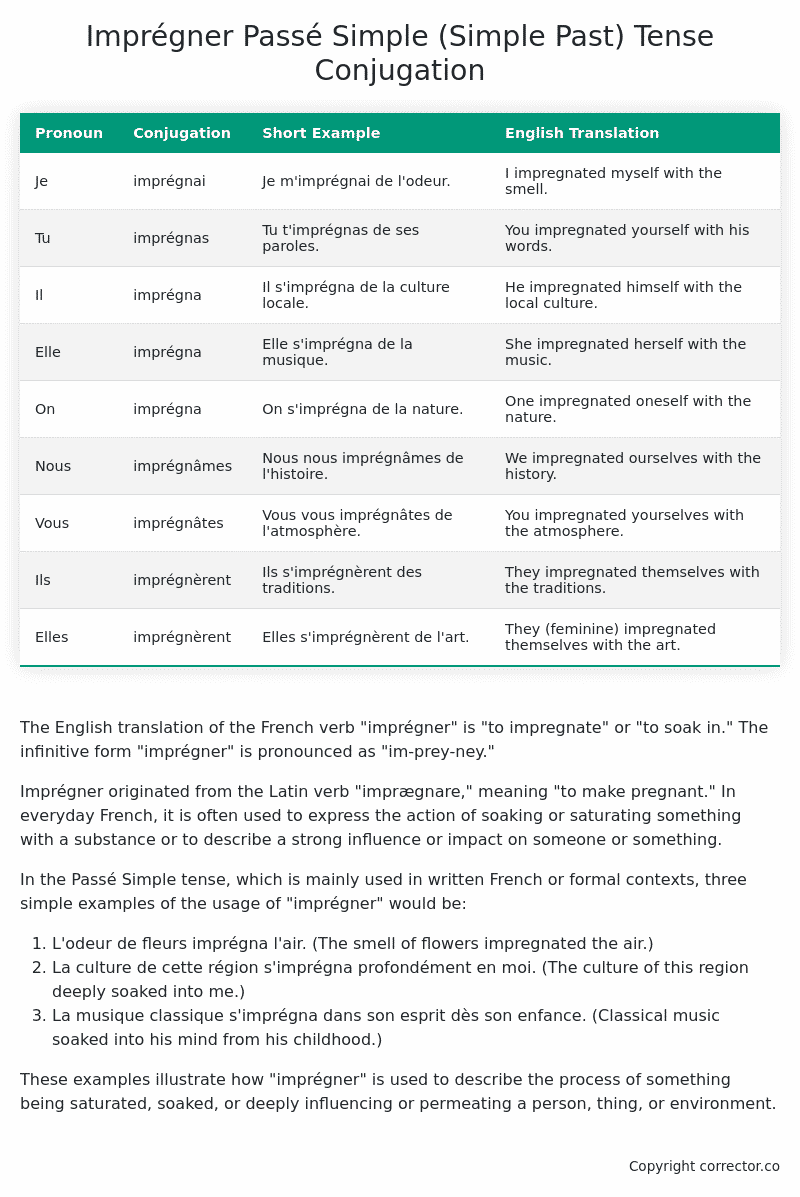Passé Simple (Simple Past) Tense Conjugation of the French Verb imprégner
Introduction to the verb imprégner
The English translation of the French verb “imprégner” is “to impregnate” or “to soak in.” The infinitive form “imprégner” is pronounced as “im-prey-ney.”
Imprégner originated from the Latin verb “imprægnare,” meaning “to make pregnant.” In everyday French, it is often used to express the action of soaking or saturating something with a substance or to describe a strong influence or impact on someone or something.
In the Passé Simple tense, which is mainly used in written French or formal contexts, three simple examples of the usage of “imprégner” would be:
- L’odeur de fleurs imprégna l’air. (The smell of flowers impregnated the air.)
- La culture de cette région s’imprégna profondément en moi. (The culture of this region deeply soaked into me.)
- La musique classique s’imprégna dans son esprit dès son enfance. (Classical music soaked into his mind from his childhood.)
These examples illustrate how “imprégner” is used to describe the process of something being saturated, soaked, or deeply influencing or permeating a person, thing, or environment.
Table of the Passé Simple (Simple Past) Tense Conjugation of imprégner
| Pronoun | Conjugation | Short Example | English Translation |
|---|---|---|---|
| Je | imprégnai | Je m’imprégnai de l’odeur. | I impregnated myself with the smell. |
| Tu | imprégnas | Tu t’imprégnas de ses paroles. | You impregnated yourself with his words. |
| Il | imprégna | Il s’imprégna de la culture locale. | He impregnated himself with the local culture. |
| Elle | imprégna | Elle s’imprégna de la musique. | She impregnated herself with the music. |
| On | imprégna | On s’imprégna de la nature. | One impregnated oneself with the nature. |
| Nous | imprégnâmes | Nous nous imprégnâmes de l’histoire. | We impregnated ourselves with the history. |
| Vous | imprégnâtes | Vous vous imprégnâtes de l’atmosphère. | You impregnated yourselves with the atmosphere. |
| Ils | imprégnèrent | Ils s’imprégnèrent des traditions. | They impregnated themselves with the traditions. |
| Elles | imprégnèrent | Elles s’imprégnèrent de l’art. | They (feminine) impregnated themselves with the art. |
Other Conjugations for Imprégner.
Le Present (Present Tense) Conjugation of the French Verb imprégner
Imparfait (Imperfect) Tense Conjugation of the French Verb imprégner
Passé Simple (Simple Past) Tense Conjugation of the French Verb imprégner (You’re reading it right now!)
Passé Composé (Present Perfect) Tense Conjugation of the French Verb imprégner
Futur Simple (Simple Future) Tense Conjugation of the French Verb imprégner
Futur Proche (Near Future) Tense Conjugation of the French Verb imprégner
Plus-que-parfait (Pluperfect) Tense Conjugation of the French Verb imprégner
Passé Antérieur (Past Anterior) Tense Conjugation of the French Verb imprégner
Futur Antérieur (Future Anterior) Tense Conjugation of the French Verb imprégner
Subjonctif Présent (Subjunctive Present) Tense Conjugation of the French Verb imprégner
Subjonctif Passé (Subjunctive Past) Tense Conjugation of the French Verb imprégner
Subjonctif Imparfait (Subjunctive Imperfect) Tense Conjugation of the French Verb imprégner
Subjonctif Plus-que-parfait (Subjunctive Pluperfect) Tense Conjugation of the French Verb imprégner
Conditionnel Présent (Conditional Present) Tense Conjugation of the French Verb imprégner
Conditionnel Passé (Conditional Past) Tense Conjugation of the French Verb imprégner
Conditionnel Passé II (Conditional Past II) Tense Conjugation of the French Verb imprégner
L’impératif Présent (Imperative Present) Tense Conjugation of the French Verb imprégner
L’impératif Passé (Imperative Past) Tense Conjugation of the French Verb imprégner
L’infinitif Présent (Infinitive Present) Tense Conjugation of the French Verb imprégner
L’infinitif Passé (Infinitive Past) Tense Conjugation of the French Verb imprégner
Le Participe Présent (Present Participle) Tense Conjugation of the French Verb imprégner
Le Participe Passé (Past Participle) Tense Conjugation of the French Verb imprégner
Struggling with French verbs or the language in general? Why not use our free French Grammar Checker – no registration required!
Get a FREE Download Study Sheet of this Conjugation 🔥
Simply right click the image below, click “save image” and get your free reference for the imprégner Passé Simple tense conjugation!

Imprégner – About the French Passé Simple (Simple Past) Tense
Formation
Usage
Narration
Historical Context
Interactions with other tenses
Passé Composé
Imparfait
Conditional and Subjunctive
Summary
I hope you enjoyed this article on the verb imprégner. Still in a learning mood? Check out another TOTALLY random French verb conjugation!


